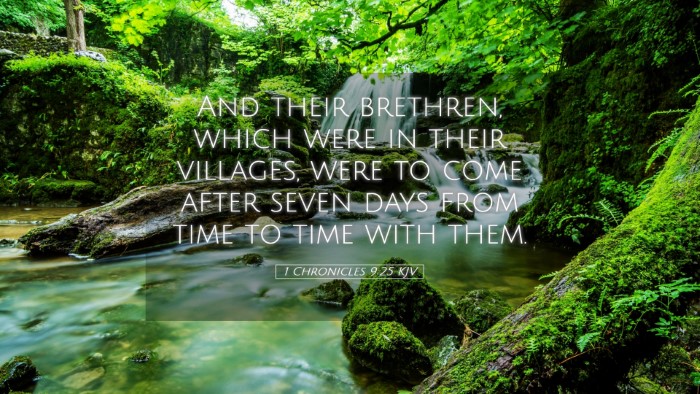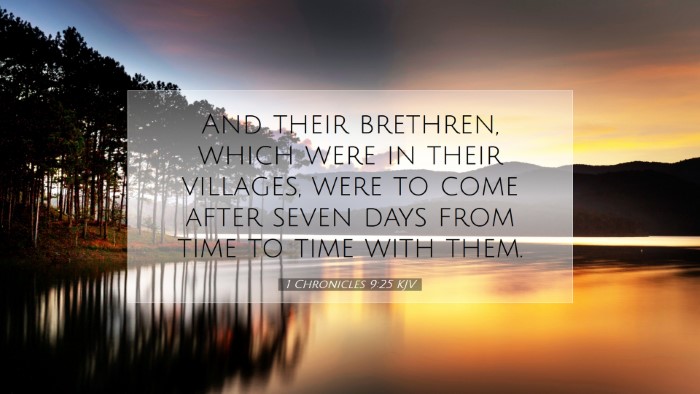Commentary on 1 Chronicles 9:25
Bible Verse: "And their brethren, which were in their villages, were to come after seven days from the villages to come in and to share with them, or as long as they would." (1 Chronicles 9:25)
Introduction
The verse from 1 Chronicles 9:25 addresses the organization of the Levites, particularly in relation to their duties and the communal aspects of their service. Through the lens of various public domain commentaries, such as those by Matthew Henry, Albert Barnes, and Adam Clarke, we gain insights into the significance of this verse in the broader context of Jewish worship and community life.
Context of 1 Chronicles
The book of 1 Chronicles is aimed primarily at the people of Israel, emphasizing the importance of worship and the preservation of the priestly lineage. The genealogies and listings throughout Chapter 9 serve to highlight the roles of different families and their responsibilities in the service of God.
Significance of the Levities
The Levites held a crucial place in the worship life of Israel, acting as mediators between God and His people. This verse specifically highlights the Levites living in villages and their obligation to join their brethren for worship. It emphasizes communal participation in worship, stressing the necessity of fellowship in serving God.
Interpretations and Insights
Matthew Henry's Commentary
Henry notes the orderly nature of the Levitical system, pointing out that the Levites were to have well-defined roles that were fulfilled in unity. He remarks on the significance of their coming together after seven days, which could symbolize a completion or fullness of time, drawing parallels to themes in God's creation and covenant with His people.
"It shows the interdependency of the Levites and their need for one another in fulfilling God's mandate. Their brethren’s willingness to travel from their villages signifies a shared commitment to worship, indicative of the body of Christ functioning together in harmony."
Albert Barnes' Commentary
Barnes elaborates on the logistical implications of Levites traveling from their villages, shedding light on the community structure of ancient Israel. He emphasizes that the arrangement reflects God's design for worship where each individual's participation was vital.
"This shows how the Lord desires His servants to be active, emphasizing the necessity of timely and regular attendance in worship, which could also be a model for modern-day Christian service and community life."
Adam Clarke's Commentary
Clarke provides a detailed exegesis, explaining the cultural implications of the Levites' duties. He suggests that the congregation's expectation for the Levites to arrive after a set time illustrates the value placed on preparation and ensuring that worship is conducted decently and in order.
"Clarke notes that these practices not only maintained the spiritual aspects of worship but were also practical in managing the lives of the Levites, who had allotted times for their service which ensured that all could partake in God’s presence."
Theological Significance
This verse not only serves as a historical accounting of Levitical organization but also carries rich theological implications. It signifies the importance of community in worship, a theme prevalent throughout Scripture. The gathering of believers in worship reflects the New Testament principle found in Hebrews 10:24-25, urging believers to not forsake gathering together.
Communal Worship
The text emphasizes that worship is not merely an individual task but a collective endeavor. This aligns with the Christian understanding of being part of the Body of Christ, where each member has a role and responsibility that contributes to the whole.
Spiritual Preparedness
The concept of returning after seven days suggests a time of preparation. In a spiritual sense, this can be interpreted as preparing one's heart and mind for worship. Just as the Levites were required to prepare themselves for their duties, so too are believers called to ready themselves to engage in communal worship.
Conclusion
1 Chronicles 9:25 offers rich lessons for the Church today. It calls attention to the beauty of community, the necessity of participation in worship, and the importance of order and preparation. As pastors, students, and scholars reflect on this verse, they are encouraged to consider how these principles can be applied in contemporary church settings to foster a vibrant, collective worship experience.
Reflective Questions
- How can modern churches implement practices that promote community and shared responsibility in worship?
- In what ways does this passage challenge you to prepare yourself for worship, both personally and collectively?
- What does the concept of coming together after a period of absence say about the nature of Christian fellowship today?


